A Historic Inauguration for Boston University: Melissa L. Gilliam Installed as 11th President
She calls for greater investment in student internship opportunities, in faculty interdisciplinary research, and ensuring access for all

BU President Melissa L. Gilliam sitting in the leather chair that belonged to one of BU’s founders, Isaac Rich. The chair was used in 1869 when BU’s three founders signed a petition to charter BU as a new corporation, and it has been featured at nearly every inauguration since. Photo by Jackie Ricciardi
A Historic Inauguration for Boston University: Melissa L. Gilliam Installed as 11th President
She calls for greater investment in student internship opportunities, in faculty interdisciplinary research, and ensuring access for all
Boston University leapt to its feet Friday to celebrate the historic inauguration of Melissa L. Gilliam as the institution’s 11th president since its founding in 1839.
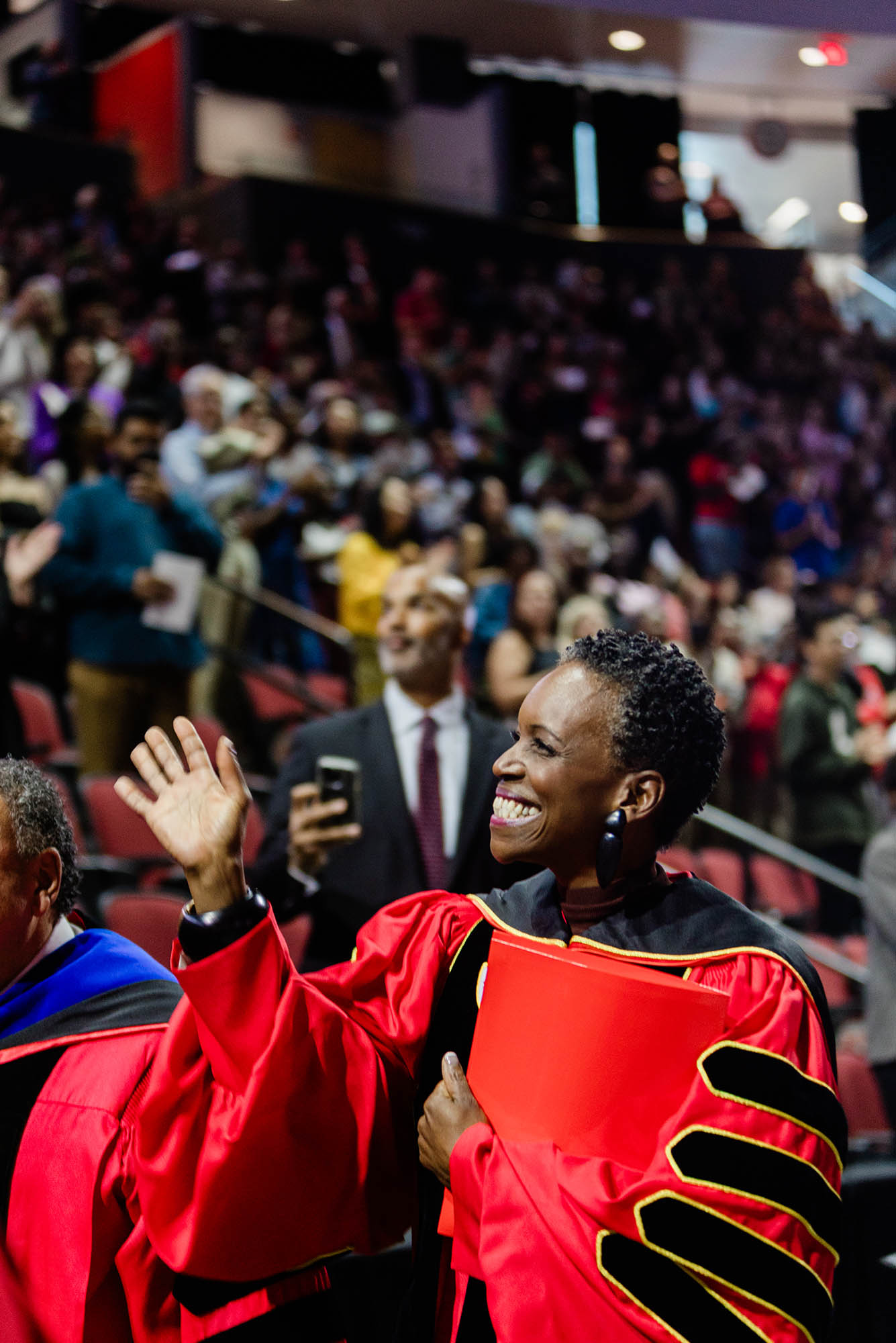
“Boston University has been a place for courage in the face of challenges,” Gilliam said in her speech at Agganis Arena to more than 2,000 students, faculty, staff, and dignitaries gathered on a beautiful fall afternoon. “A place of openness in a society that was often closed; a place of optimism during times of hopelessness; and a place that has been open to an increasingly global world, when many others could only see what was directly in front of them.
“To Boston University’s trustees, faculty, staff, students, alumni, and friends: now is our moment,” she said. “Let us use our traditions of intellectual courage, academic rigor, service, openness, art, and creativity to drive our next transformation.”
Her words were answered with a rousing ovation, in a ceremony that also featured remarks via video from Boston Mayor Michelle Wu and Massachusetts Governor Maura Healey.
“Today, we continue our journey forward, taking BU to its next level of transformation and commitment to excellence—at this critical time in the world, both home and abroad, and also in higher education,” said Ahmass Fakahany (Questrom’79), chair of the BU Board of Trustees. “We could not be more pleased and excited to have Dr. Melissa Gilliam leading us on this journey as we continue to unravel our potential.”

Access for all was a key theme of the speech by Gilliam, who follows the 18-year tenure of Robert A. Brown and the yearlong interim presidency of Kenneth Freeman during the presidential search process. Both Brown and Freeman attended Friday’s ceremony.
“As we look forward, we must continue to ensure that Boston University provides a singular and transformative educational experience, and that all qualified students, regardless of their background, can access opportunity,” Gilliam said in her address. “We must find ways to address the rising costs of higher education, while also ensuring that our students are prepared for life after graduation, so they can see a return on the significant investment of their time.”
To that end, she announced a new vision for student career advancement: to increase internship participation and improve career outcomes across all academic programs, while at the same time offsetting the cost of education. Funding for working in laboratories and workplaces will be widely available for students to complete career-building internships, she said, with details on the program to follow in the coming weeks and months.
Other initiatives that she will roll out include a commitment to fully embrace the power of interdisciplinary collaboration. “Let’s transform the University by redefining integrated research,” she said, “by enabling the sciences, the social sciences, and the humanities to converge, in laboratories, spaces, and in classrooms across our campuses.” She noted that her administration will provide seed grants and create a multidisciplinary faculty advisory council to remove unnecessary barriers to collaboration in research, teaching, and learning.
Gilliam, a physician, will be BU’s first president to have a second office on the Medical Campus. She pledged to continue the University’s “fierce commitment” to Boston by reinvigorating its partnership with Boston Medical Center and better integrating the Charles River Campus and the Medical Campus, which are separated by two miles across the city’s Back Bay and South End neighborhoods.
A graduate of Harvard Medical School, Gilliam is also a BU clinical professor of obstetrics and gynecology, professor of sociology, and professor of epidemiology. She is a distinguished educator, scholar, research scientist, and physician. Her scholarship focuses on interventions to promote adolescent health and well-being. She spent the majority of her career at the University of Chicago, where she was vice provost before joining Ohio State University as executive vice president and provost.
During her address, she described a renewed commitment on the part of Boston University to the global community, citing last week’s launch of the Ravi K. Mehrotra Institute for Business, Markets, & Society at the Questrom School of Business, plus the coming expansion of the Frederick S. Pardee School of Global Studies and a reimagined International Advisory Board.
While controversy has roiled many campuses across the country recently, Gilliam also pledged to strengthen the University’s commitment to free speech and academic freedom while working to promote civil discourse and find common ground.
“As you can see, we have a proud history of advocacy and protest here at BU,” she said with a smile, a few moments after a small Gaza-related student demonstration briefly disrupted the ceremony.
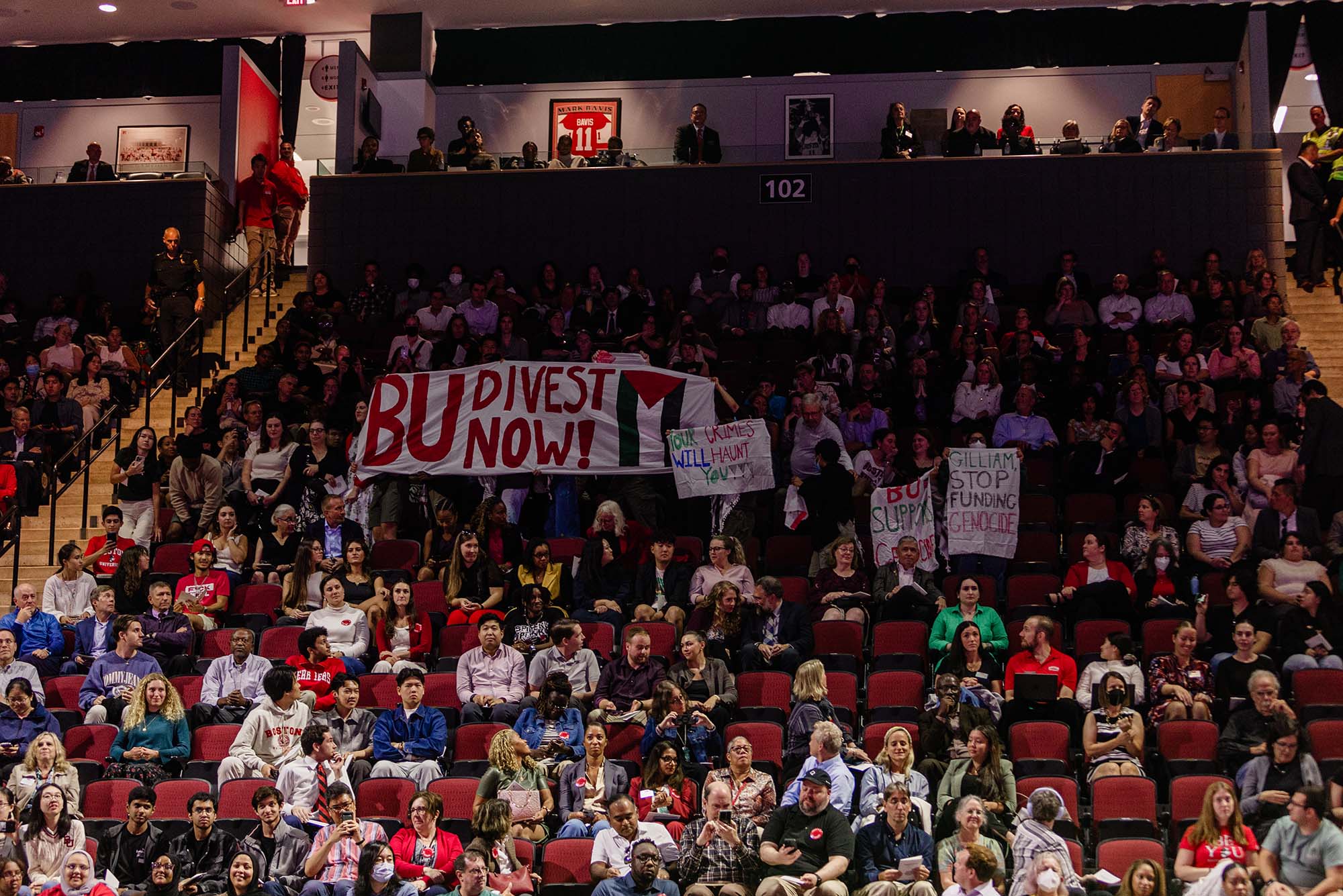
“Creating a community in which each of us can fully contribute to the life of this campus requires each of us to commit to regarding one another with dignity and respect,” she said. “Today, I’m announcing a new initiative in which we will focus on living our values and building our skills in discourse. This initiative will serve as a platform for deepening our commitment to free expression and discourse across our differences.”
Creating a community in which each of us can fully contribute to the life of this campus requires each of us to commit to regarding one another with dignity and respect.
Gilliam also described an “ambitious vision” to put the arts “front and center across our campuses” and named Harvey Young, dean of the College of Fine Arts, to lead a President’s Advisory Council on the Arts,
“My own dear father, Sam Gilliam, who was born in Tupelo, Mississippi, in 1933, was inspired by the improvisation of jazz music, the most original of American musical forms,” Gilliam said, “and he transformed painting into sculpture by draping canvases from ceiling to floor and along the outside of buildings, now gracing museums around the world. At times when the logic, beauty, and grace of science fail to convince minds, I can think of nothing more salient, more penetrating, more perfect than art.”
Gilliam did not directly mention her own historic role as the first female president and the first Black president of Boston University, but to others it was an important milestone to celebrate.
Akwasi Antwi (CAS’25), president of Boston University Student Government, took note in his welcome. “Dr Gilliam’s arrival as our University president signifies more than just a changing of the guard, a mere reshuffling of administrative structure,” Antwi said. “To so many diverse students here, she represents so much more: the hope that she gives students who see themselves in her. The aspiration of students who are eager to see positive change on campus. The inspirational leadership ideas that she’ll bring as a result of her experience. Most importantly, the opportunity to have a leader who looks like us.”
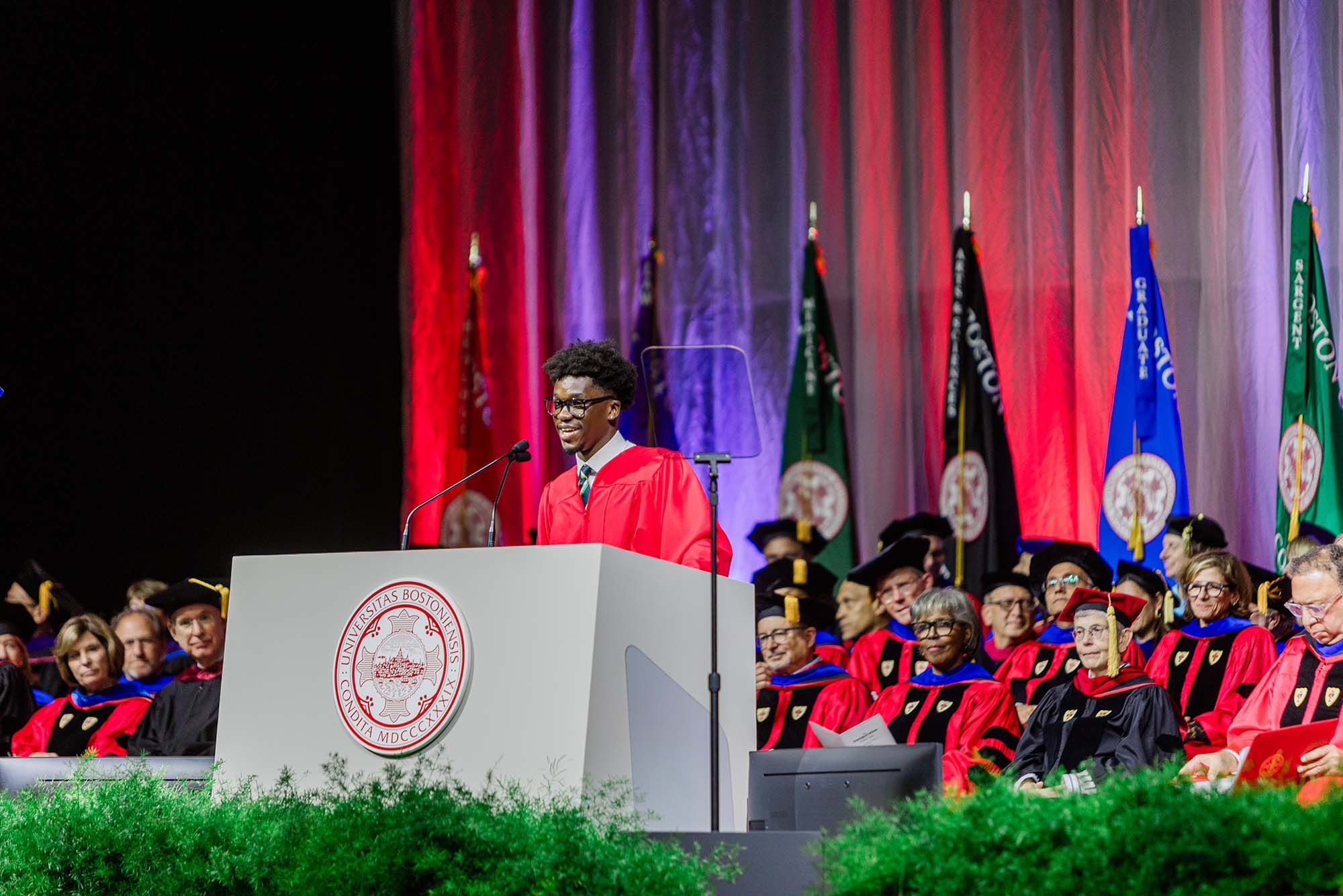
“You are joining so many amazing women leading in the Hub of education,” Mayor Wu said in her video greeting. Wu noted that, like Gilliam, she broke new ground as the first woman and first person of color elected mayor of Boston. “As a doctor and a passionate advocate for equity and justice, you are the perfect person to lead one of Boston’s pillars of education.”
“Your dedication to education, achievement, and opportunity so aligns with the values of this phenomenal institution,” Governor Healey said in her video. “I’m confident that under your leadership, Boston University will continue to produce the next generation of leaders, innovators, and problem solvers.”
Representatives of BU trustees, faculty, staff, and alumni also delivered brief welcoming remarks.
“As the famous poet Maya Angelou said, ‘When somebody shows you who they are, believe them,’” said Cynthia Cohen (MET’77), vice chair of the Board of Trustees and chair of the Transition Committee. “You have shown us your compassion, your intelligence, your pride in BU’s foundations, and your ambitions for our fine institution. As Maya Angelou would reflect, you showed us. We believe you and we believe in you.”
Thomas Rosenbaum, president of the California Institute of Technology, spoke for the more than 60 other colleges and universities around the country that were represented at the ceremony. “I express our excitement at President Gilliam’s installation and offer our partnership as she launches what is sure to be a powerful and inspirational chapter in BU’s history,” Rosenbaum said.
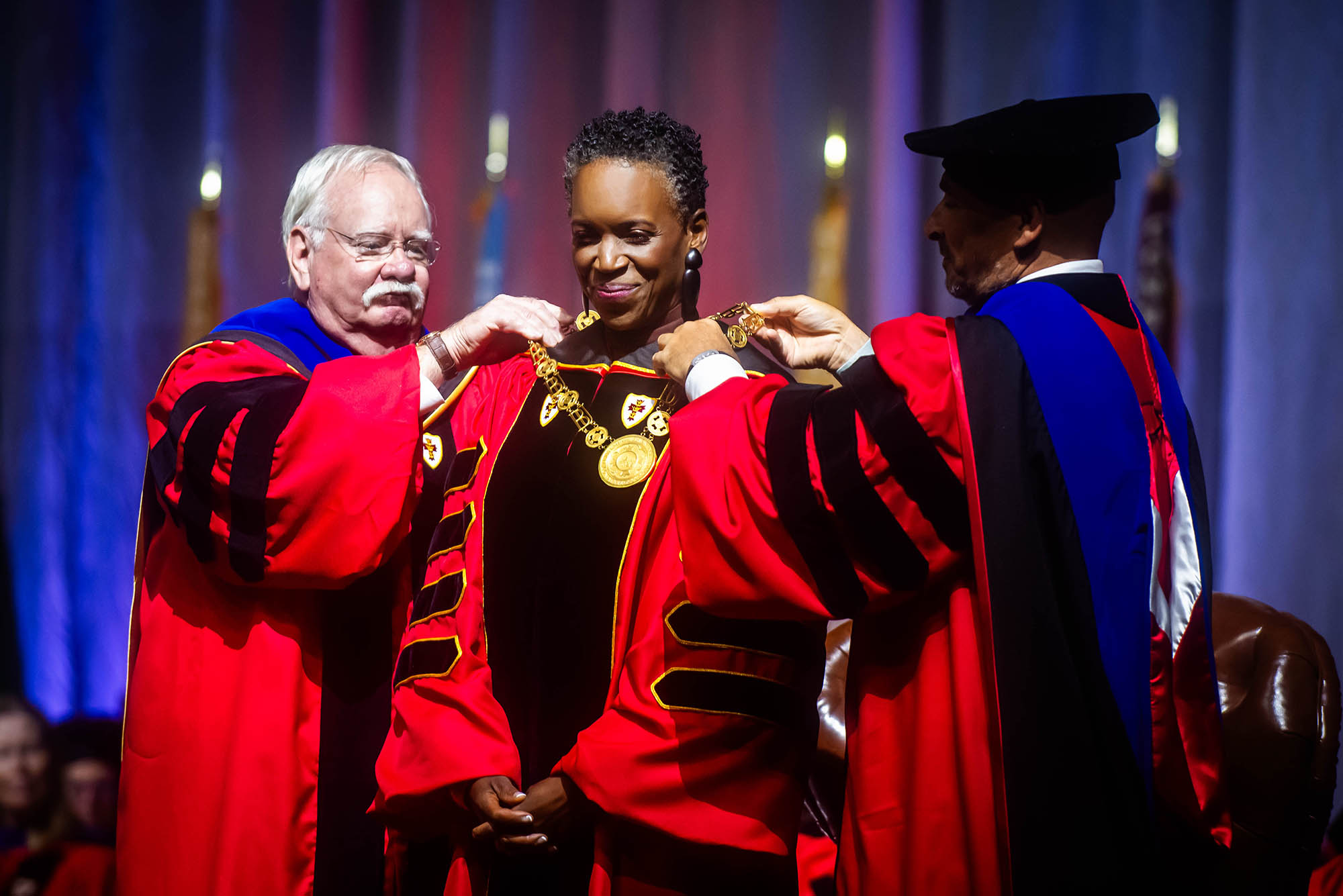
During the ceremony, Gilliam was presented with the University’s colors, its charter, the Founder’s Chair, and the President’s Collar. She began her duties at BU on July 1. In her remarks, she acknowledged Brown’s transformative tenure at BU and Freeman’s role in helping to bridge the period to her presidency.
“Bob, you led this institution through an extraordinary transformation during your nearly 20 years as president,” Gilliam said. “Thanks to you both, I am taking on the leadership of a university riding a wave of incredible momentum.”
The ceremony featured the singing of the BU anthem “Clarissima,” performances by the alumni group Sons of Serendip, the BU a cappella group the Treblemakers, and the BU Brass Choir, with singer Arielle Rogers-Wilkey (CFA’25). Robert Pinsky, a William Fairfield Warren Distinguished Professor, director of the Creative Writing Program, and former US poet laureate, read a poem, Robert Hayden’s “Those Winter Sundays.”
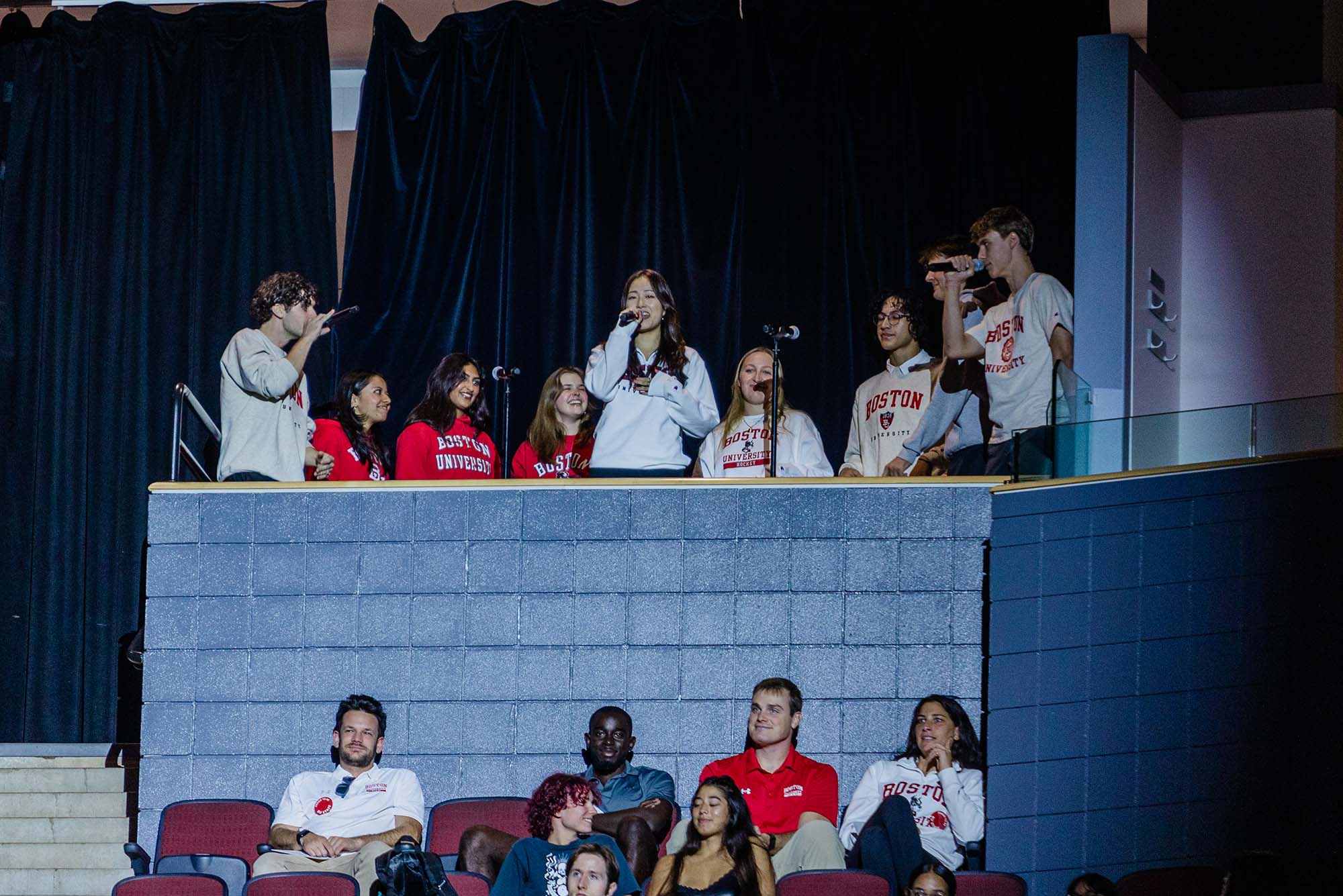
As the ceremony got underway, a 50-person crowd of BU Graduate Workers Union (BUGWU) members and undergraduate students in the University’s Democratic Socialists of America and Students for Justice in Palestine chapters formed outside Agganis Arena. The student demonstrators held aloft signs such as “Tuition high and wages low, where does all the money go?” while chanting “Money for workers and education, not for violent occupation,” and calling for Gilliam to divest University funding from Israeli-backed companies.
Union members handed out leaflets bearing a QR code that when scanned sent a letter to Gilliam in support of the ongoing BUGWU strike. They later called upon Gilliam to honor their strike demands. “We’re hoping that President Gilliam can, as a new president, reach out and show workers that she is on our side, give us a fair contract, and help end this cycle of having to fight for a fair wage and a dignified life,” says BUGWU member Carlos Campos, Jr. (GRS’30,’30).
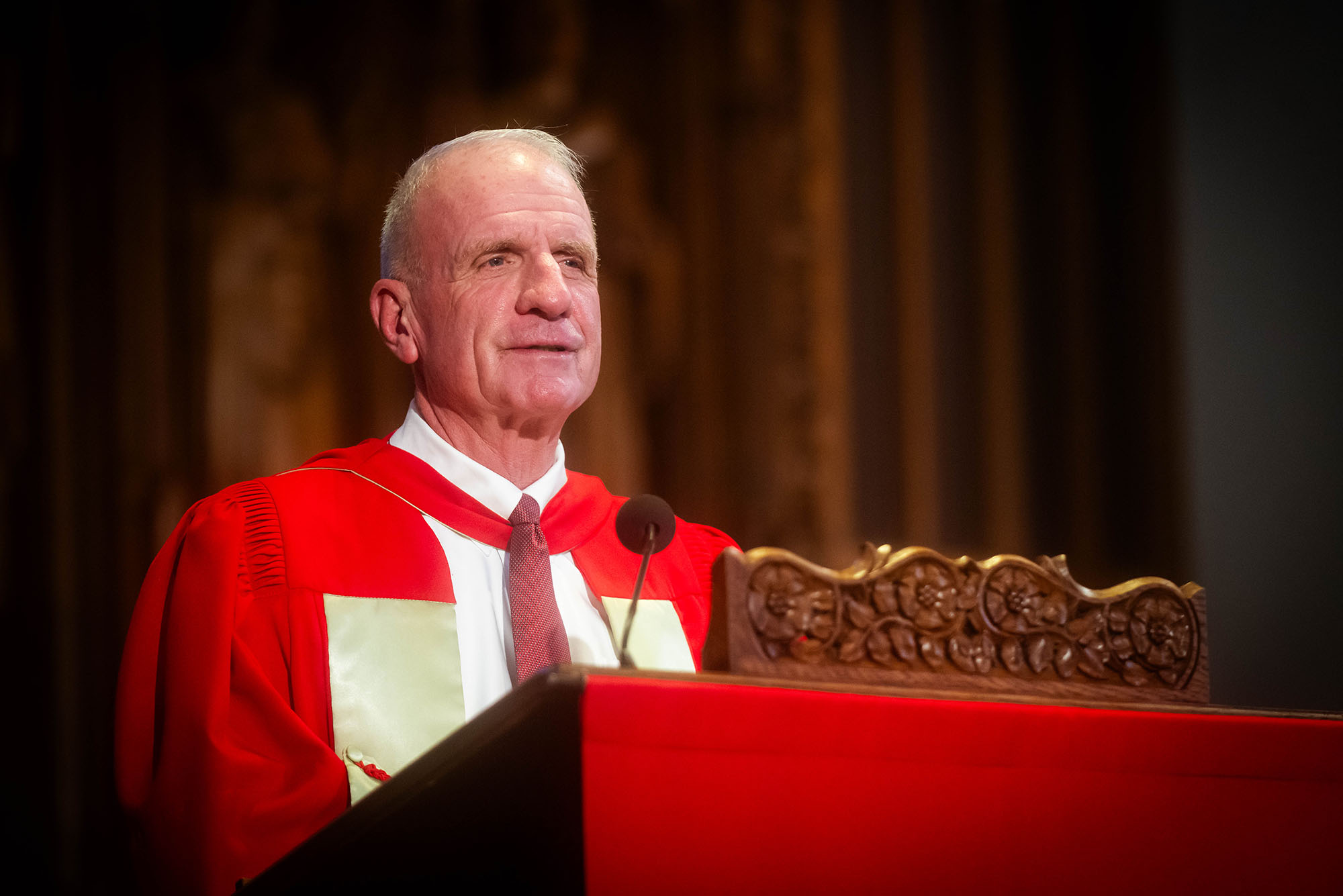
On the Medical Campus, a crowd of around 50 gathered for a watch party in the Instructional Building’s 14th floor Hiebert Lounge. Surrounded by floor-to-ceiling views of the Boston skyline, the watchers applauded Gilliam’s pledge to elevate the Medical Campus and remove barriers between BU’s campuses. Watchers then headed to a lively celebration on Talbot Green, accompanied by music from the BU Medical Campus Band.
There was also a celebration at FitRec for those who attended the ceremony at Agganis. Guests were greeted with refreshments and tunes provided by a jazz quintet. As the room filled up with people, Rhitamvara Pokharel (SSW’28) and her friends looked back on the week’s events. These events “were celebrating the inauguration,” she said, “but at the same time, they gave people the opportunity to hang out together, despite a busy beginning to this semester.”
“She gives me a lot of hope,” her friend Emily Lamunu (SSW’27) added. “It was nice seeing someone who looks like me reach such a high position. There’s a lot to look forward to.”
@bostonu Now pitching for Boston University, President Melissa Gilliam! #bostonuniversity #fenway #redsox ♬ Come Inside Of My Heart – IV Of Spades
In the video above, Gilliam concludes her Inauguration festivities by throwing out the ceremonial first pitch at BU Night at Fenway Park. The Red Sox hosted the Tampa Bay Rays in the season’s final home series. Video by Nick Rocca
Earlier Friday, Gilliam and her family joined nearly 200 BU officials and students at Marsh Chapel to start the day with a service of prayer and thanksgiving. The Rev. Robert Allan Hill, dean of Marsh Chapel, led an interdenominational service that featured a reflective and celebratory selection of readings, hymns, and prayers.
Hill situated Gilliam’s inauguration within the long history of BU, and within the University’s own relationship to the cultures around and within it. “We have had the privilege, here, of good guidance, good leadership, good shepherding, and in that vein and with grace in prayer and thanksgiving, we begin together this day, here in this moment of meditative quiet,” Hill said. He listed the University’s past presidents and notable alumni, including civil rights leader Martin Luther King, Jr. (GRS’55, Hon.’59), as among the many people who have shaped BU’s legacy.
“But mostly today,” Hill said, “we’ll remember that we are—Boston University—transforming the culture around us. That’s who you are.”
Comments & Discussion
Boston University moderates comments to facilitate an informed, substantive, civil conversation. Abusive, profane, self-promotional, misleading, incoherent or off-topic comments will be rejected. Moderators are staffed during regular business hours (EST) and can only accept comments written in English. Statistics or facts must include a citation or a link to the citation.